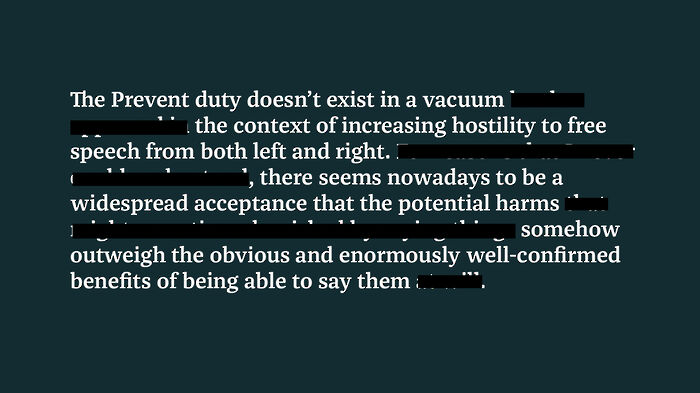Review of Prevent strategy announced by Security Minister
The counter-terrorism strategy rolled out in 2016 has come under sharp criticism across the University of Cambridge as curtailing freedom of speech

Security minister Ben Wallace announced today that the Prevent strategy, the government’s counter-terrorism strategy that seeks to prevent radicalisation, will see an independent review.
The Prevent strategy makes it a legal requirement for public bodies, such as universities, to report those who may be at risk of turning to extremism. The legislation has faced scrutiny from civil rights groups such as Amnesty International as well as across the academic community and elsewhere: many have argued it fosters racial profiling of those of Muslim faith and that it negatively impacts freedom of speech.
In his announcement in the House of Commons, Wallace said: “I have decided that the time is now right to initiate a review of Prevent. Communities across the country have got behind the policy and are contributing to it because they want, as we do, their own young people to be protected from grooming and exploitation by terrorists.”
The University of Cambridge has said in the past that it is “committed to trying to take the lightest possible touch” concerning Prevent.
However, its intervention in a 2017 panel discussion co-hosted by the Cambridge University Palestine Society and the Cambridge University Middle East Society faced criticism by students and academics at the time as being “heavy-handed”. Cambridge later apologised for its citation of the Prevent duty in replacing the panel chair, SOAS academic Dr Ruba Salih.
A Varsity investigation last April revealed that the roll-out of the Prevent duty in Cambridge also saw stark inconsistencies across colleges, causing caused some Muslim students to “self-censor” in supervisions. One student, Abdulla Zaman, described his supervisor warning him “not to raise any alarm bells”, after assigning him topics relating to the Israeli-Palestinian conflict.
After an incident at the University of Reading in November where an essay written by a left-wing academic was marked as ‘sensitive’ under Prevent legislation, several academics at Cambridge spoke to Varsity about their views on the strategy, with one academic commenting that it “continues to be a central threat to the purpose and promise of higher education in the UK”.
CUSU, the GU and numerous college JCRs have also criticised the inclusion of welfare support as part of the information shared under Prevent.
Numerous organisations and advocates have called on the scheme to be reviewed, including Parliament’s joint committee on human rights and the Muslim Council of Britain.
The Muslim Council of Britain said: “We welcome the Government’s support for a review; however, those tasked with its implementation must have the independence, credibility and trust required to deliver it.”
Wallace said today that Home Office statistics “show that Prevent is not about out any particular group or ideology but is similar to other forms of safeguarding carried out every day by social workers, teachers and police.”
He added: “This review should expect those critics of Prevent, who often use distortions and spin, to produce solid evidence of their allegations.”
 Comment / Plastic pubs: the problem with Cambridge alehouses 5 January 2026
Comment / Plastic pubs: the problem with Cambridge alehouses 5 January 2026 News / Cambridge academics stand out in King’s 2026 Honours List2 January 2026
News / Cambridge academics stand out in King’s 2026 Honours List2 January 2026 News / Cambridge businesses concerned infrastructure delays will hurt growth5 January 2026
News / Cambridge businesses concerned infrastructure delays will hurt growth5 January 2026 News / AstraZeneca sues for £32 million over faulty construction at Cambridge Campus31 December 2025
News / AstraZeneca sues for £32 million over faulty construction at Cambridge Campus31 December 2025 Interviews / You don’t need to peak at Cambridge, says Robin Harding31 December 2025
Interviews / You don’t need to peak at Cambridge, says Robin Harding31 December 2025









